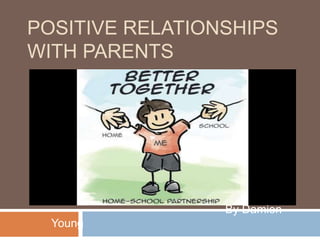
Assignment 1 positive relationships with parents
- 1. POSITIVE RELATIONSHIPS WITH PARENTS By Damion Young
- 2. Developing good parent/teacher relationships. Where the education of children are concerned. There need to be a combined effort from teachers and parents, if children are to exceed. It is evident that positive communication between parents and teachers assists in improving the academic performance of the child or children involved. The two most influential persons in a child’s life are his/her parents and teachers. Therefore, they should work together to mold the child’s success. The teacher’s journey involves creating
- 3. Developing relationships with parents Smile When You See Parents: Greet them. The impressions left from fleeting encounters in the hallway last a long time.
- 4. Developing relationships with parents Declare Your Intention: Tell them that you want to partner with them, that you appreciate their support, and look forward to working together.
- 5. Developing relationships with parents Give positive praise first when calling parents or meeting with them to discuss a concern. Every kid has something good about him/her. Find it. Share it. Then share your concern. Adhere strictly to this rule. Lead with the Good News:
- 6. Developing relationships with parents Ask Questions about the Child: "What kinds of things does he enjoy doing outside of school? Who are the special people in her life -- family or family friends? What do you think are her best characteristics? What was he like as a little boy?" Demonstrate an interest in knowing your student. Listen to Parents Really listen. They know a whole lot about their kid.
- 7. Developing relationships with parents Invite Parents to Participate in Making Some Decisions: Invite their input, give them information that will help them form an opinion, and listen to their conclusions.
- 8. Developing relationships with parents Thank Parents: Both individually and publicly for their support, perhaps in your weekly newsletter. Recognize what they do to help your class and how it's impacting students.
- 9. Developing relationships with students The best teachers have the ability to maximize the potential of every student in their class. They understand that the key to unlocking student potential is by developing positive teacher student relationships (Meador, 2014).
- 10. Developing relationships with students Provide Structure – In general, children respond positively to having some level of structure in their classroom . It makes them feel safe and leads to increased learning. It is essential that teachers set the tone early by establishing clear expectations and practicing class procedures. Finally, a structured classroom is one with minimal downtime. Each day should be loaded with engaging learning activities with little to no downtime.
- 11. Developing relationships with students Teach with Enthusiasm and Passion – Students will respond positively when a teacher is enthusiastic and passionate about the content they are teaching. Excitement is contagious! If you are not excited, why should your students excited?
- 12. Developing relationships with students Have a Positive Attitude – Personal issues should not interfere with your ability to teach. Teachers should approach their class each day with a positive attitude. Positivity is transcending. No one likes to be around someone when they are always negative. Students will in time resent a teacher who is always negative. However, they will run through a wall for a teacher is positive and continuously offering praise.
- 13. Developing relationships with students Learning should be fun and exciting. Students love creative, engaging lessons that grab their attention and allow them to take ownership in the learning process. They enjoy hands-on activities where they can learn by doing. They are excited about using technology and applying it to lessons. Students love teachers who are creative, fun, engaging activities into their daily classroom. Make Learning Fun:
- 14. Developing relationships with students Treat Them With Respect – Your students will never respect you if you do not respect them. You should never yell, use sarcasm, single a student out, or attempt to embarrass them. Those things will lead to a loss of respect from the entire class. Handle situations professionally. You should deal with problems individually, in a respectful, yet direct and authoritative manner. You cannot play favorites. The same set of rules must
- 15. Developing Relationships with Teachers To develop a successful teacher with teacher relationship it’s important to begin with the end in mind, (enthusiasm regarding each students success). It is founded on good communication and trust. By working together. By showing professionalism. By respecting each other.
- 16. References (2011) Edutopia. 20 Tips for developing positive relationships with parents. Retrieved from http://www.edutopia.org Meador, D. (2014) About Education. Tips for developing positive teacher student relationships. Retrieved from http://www.teacheing.about.com Dr. Jones, S (Oct, 2011) Education Topics. The secret to a successful principal and teacher relationship. Retrieved from http://www.sevenbooks.blogspot.com